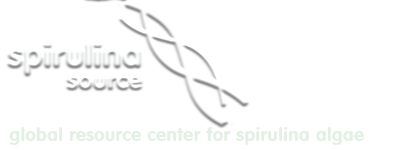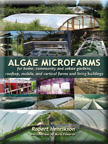REFERENCES AND ABSTRACTS BY HEALTH CATEGORY
Spirulina scientific reference library. Over 100 references covering 45 years of international research.
Click on PDF Download button for free pdf file.
![]() The Potential Protective Effect of Spirulina platensis against Mycotoxin Induced Oxidative Stress and Liver damage in Rats. by JHussein S.A. et al. Pub. in Benha Veterinary Medical Journal, Vol. 35, No. 2: 375-383, 2018. Egypt.
The Potential Protective Effect of Spirulina platensis against Mycotoxin Induced Oxidative Stress and Liver damage in Rats. by JHussein S.A. et al. Pub. in Benha Veterinary Medical Journal, Vol. 35, No. 2: 375-383, 2018. Egypt.
The present study was conducted to evaluate the protective effect of Spirulina on mycotoxins induced liver damage and oxidative stress in rats.
Spirulina protected mycotoxins induced liver damage in rats caused a significant improvement of all previous parameters and attenuates DNA changes. Conclusively, Spirulina Platensis treatment exerts a protective effect against DNA damage and oxidative stress in liver of mycotoxin intoxicated rats through free radical scavenging and anti- inflammatory activities as well as regenerating endogenous antioxidants defense system mechanisms.
![]() Protective effects of Spirulina maxima on hyperlipidemia and oxidative-stress induced by lead acetate in the liver and kidney.
Protective effects of Spirulina maxima on hyperlipidemia and oxidative-stress induced by lead acetate in the liver and kidney.
by JC Ponce-Canchihuaman, et al. Pub. in Lipids in Health and Disease 9:35 2010. Mexico.
Oxidative damage has been proposed as a possible mechanism involved in lead toxicity, specially affecting the liver and kidney. Previous studies have shown the antioxidant effect of Spirulina maxima in several experimental models of oxidative stress. The current study was carried out to evaluate the antioxidant activity of Spirulina maxima against lead acetate-induced hyperlipidemia and oxidative damage in the liver and kidney of male rats.
Results: The results showed that Spirulina maxima prevented the lead acetate-induced significant changes on plasma and liver lipid levels and on the antioxidant status of the liver and kidney. On the other hand, Spirulina maxima succeeded to improve the biochemical parameters of the liver and kidney towards the normal values of the Control group. Conclusions: It was concluded that Spirulina maxima has protective effects on lead acetate-induced damage, and that the effects are associated with the antioxidant effect of Spirulina.
Effect of chlorella, spirulina and chlorophyllin on fecal excretion of polychlorinated dibenzo-p-dioxins in rats.
by K. Morita, T. Matsueda, T. Iida. Fukuouka Institute of Health and Environmental Studies, Fukuoka 818-01, Japan. Pub. in Japan Journal Toxicology Environ. Health. 43 (1) 42-47 1997. Japan.
The paper presents the liver distribution and fecal excretion of polychlorinated dibenzo-p-dioxins (PCDDs) congeners in male rats fed with Chlorella, Spirulina and chlorophyllin. The objective of this study is to evaluate the effect of PCDD excretion by the chlorophyllin foods. The rats were given some treatment diets containing 20% Chlorella, 20% Spirulina, 0.2% 2% chlorophyllin, 10% rice-bran fiber or 2% chlorophyllin + 10% rice-bran fiber for 5 days. Then the animals were administered 4 g of each diet containing 0.5 ml of the causal rice-bran oil of Yusho that had occurred in the Southwest part of japan in 1968 and kept on the same diet for another 5 days. The rice bran oil contaminated with PCDDs was used for the animal experiments. PCDD congeners in the feces and liver were analyzed by high resolution gas chromatography-mass spectrometry. The fecal excretion of PCDDs in the groups fed with Chlorella, Spirulina and 2% chlorophyllin were 7.4, 7.1 and 11.0 times higher respectively, than that in the control group. These findings suggest that the administration of Chlorella, Spirulina and chlorophyllin is useful as a new approach in the treatments of patients exposed to lipophilic zenobiotics.
Effect of spirulina on the renal toxicity induced by inorganic mercury and cisplatin.
by H. Fukino, et al. 1990. Pub. in Eisei Kagaku, 36:5, 1990. Japan.
Kidney toxicity caused by mercury was suppressed by feeding spirulina to rats. A water soluble extract of Spirulina, containing phycocyanin, the natural blue pigment, was examined. Renal (kidney) toxicity in rats caused by para-Aminophenol (pain reliever) and Cisplatin (anti-cancer) was significantly reduced by the phycocyanin extract of spirulina. Researchers concluded that phycocyanin plays a major role in the protective effect of spirulina against renal failure caused by mercury and pharmaceutical drugs, and that spirulina might be applicable to the reduction of general renal disfunction.
The effect of spirulina on nephrotoxicity in rats.
by Y. Yamane, et al. 1988. Chiba Univ. Presented at Annual Symposium of the Pharmaceutical Society of Japan, April 15, 1988. Japan.
Heavy metals and pharmaceutical drugs are toxic to the kidney. The effects of spirulina on acute nephritis caused by inorganic mercury and pharmaceutical drugs were examined in rats. High mercury dosage caused nephrotoxcity in laboratory rats, measured by rising blood urea nitrogen (BUN), serum creatinine, urinary enzymes alkaline phosphatase (ALP) and glutamic oxaloacetic transaminase (GOT). When rats were fed a diet of 30% spirulina, these factors significantly decreased, showing kidney detoxification. Three groups of rats were given pharmaceutical drugs used by humans: para-Aminophenol (anodyne/pain reliever), Gentamicin (anti-biotic) and Cisplatin (anti-cancer). Once again rats improved. The study suggests spirulina may have a beneficial effect for humans suffering from heavy metal poisoning and that kidney side effects may decrease when spirulina is taken with the administration of drugs. Side effects limit the dosage of drugs and slow down recovery, so shorter recovery times may be possible.




